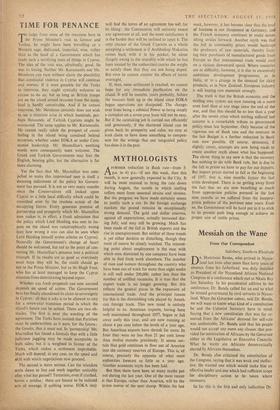MYTHOLOGISTS
AFURTRER reduction in Bank rate—from 5 p.c. to 41 p.c.—if not this week, then this month, is now generally expected in the' City. It will be most unusual to bring the rate . down during August, the month in which sterling suffers most from seasonal strains and stresses. But the progress we have made certainly seems to justify such a cut. In the foreign exchange markets the pound remains in exceptionally strong demand. The gold and dollar reserves, against all expectations, actually increased dur- ing July, and may still be growing. Much has been made of the fall in British exports and the rise in unemployment. But neither of these trends is yet either decisive or disturbing, though they must of course be closely watched. The interest- ing point about employment is the ease with which men dismissed by one company have been able to find fresh work elsewhere. The number of men and women throughout the country who have been out of work for more than eight weeks is still well under 200,000, rather less than the number of unfilled vacancies. It is true that the export trade is no longer growing. But this reflects the general pause in the expansion of international trade. And the principal reason for this is the diminishing role played by Ameri- can foreign trade. This new trend is entirely helpful to us. American imports, having been well maintained throughout 1957, began to fall away early this year, and are now running at about 4 per cent below the levels of a year ago. But American exports have shrunk far more. In June they were no less than 21 per cent lower than twelve months previously. It seems cer- tain that gold continues to flow out of America into the currency reserves of Europe. This is, of course, precisely the opposite of what most authorities forecast as little as a year ago. Another economic myth has been laid.
But then there have been so many myths put out during the last year. One of the most recent is that Europe, rather than America, will be the prime mover of the next slump. Within the last week, however, it has become clear that the level of business is not threatened in Germany, and the French economy continues to make aston- ishing strides forward. Another myth was that the fall in commodity prices would bankrupt the producers of raw materials, thereby limit- ing their purchases of manufactured goods from Europe so that international trade would start on a vicious downward spiral. Where countries are in difficulty, however, it is due to excessively ambitious development programmes, as in India, or to a change in the demand for dairy products, as in New Zealand. European industry is still buying raw materials strongly.
The truth is that the British economy and the sterling area system are now running on a more even keel than at any stage since the end of the war, and that this should be so less than a year after the severe crisis which sterling suffered last autumn is a remarkable tribute to government policy since last September. Only because of the vigorous use of Bank rate and the restraint in "the last Budget is a further reduction in Bank rate now possible. Of course, strenuous, if slightly comic, attempts are now being made to create another myth about what has happened. The clever thing to say now is that the recovery has nothing to do with Bank rate, but is due to the fall in prices we have to pay for our imports. But import prices started to fall at the beginning of 1957, that is, nine months before the last crisis developed. There is no getting away from the fact that we are now benefiting as much from appropriate policies pursued in the last nine months as we suffered from the inappro- priate policies of the previous nine years. Even so, the Government will be hard put to it to stick to its present path long enough to achieve its proper aim of stable prices.






























 Previous page
Previous page